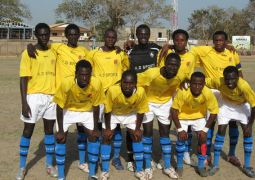Sunday 22nd July 2012 marked exactly 18 years since President Yahya Jammeh became the leader of The Gambia and, unlike the previous years, this year’s celebration was declared by the presidency to be a low-key affair due to the holy month of Ramadan.
When he deposed his predecessor, Sir Dawda Kairaba Jawara, in a bloodless coup on 22 July 1994, Jammeh was only 29 years old at the time, and few people gave him any chance.
Eighteen years on, he has no doubt weathered the storm, and learnt a lot on the job.
However, what we are interested in is what the Jammeh administration has been able to do for the people of this country, and what he has not done, over the past 18 years.
This is because he has sworn to serve the people of this country.
Ever since he took the reins of power in July 1994, there has been tremendous improvement in the social sector. There are more hospitals and health centres now than ever before; just as there has been an explosion of schools all around the country.
For the first time in the history of this country, Gambians are now able to acquire university education on home soil.
The country has over the years seen its own medical doctors trained at the medical school of the university, which has also expanded so rapidly that it also has a Law faculty among others.
The national road network has also improved remarkably. As for telecommunications, there are now four GSM companies operating successfully in The Gambia.
These are all big achievements.
But transportation is still in a difficult state, especially during this rainy season. With the absence of the GPTC buses, many people find it very difficult to get to their destinations or even if they do, they have to pay double fares.
The GPTC buses need to come back on the road to ease the mounting transport difficulties faced by commuters day after day.
In the same vein, there is a need for more ferries, though there are already two new ones, which are yet to start operations.
The government together with the Gambia International Airlines (GIA) and the Gambia Civil Aviation Authorities (GCAA) should work out ways of reducing air fares so that prospective travellers do not have to go to
Peace is the trademark of The Gambia. That is why the government has to provide the police with a lot of incentives to deal with crimes hitherto unknown to Gambians like armed robbery, murder, drug trafficking, rape, among others, which are creeping into our society.
The police should be given more vehicles, and more pay to spur them to ensure our collective security.
At the same time, farmers should be made to feel that their produce will be bought at the end of the day, and not otherwise.
This will encourage them to engage more seriously in agricultural production.
At the international level, we need to work hard on our relations with other ECOWAS countries by opening a dialogue with them to thrash out any misunderstandings.
On the human rights front, the issues are numerous, including the fact of people being remanded without trial for an unduly long time, which needs to be addressed. The same applies to the matter of people acquitted and discharged by courts only to be re-arrested.
In the coming years, Gambians would like to see the rule of law given pride of place in the spirit of good governance. In this case, due process must be followed at all times so that human rights are always seen to be respected.
Gambians will be happy to see that no one is detained for more than 72 hours without trial.
Civil servants would also like to see a
After 18 years of APRC rule, there is need for greater tolerance and accommodation of those always pejoratively termed as “unpatriotic” simply because they are opposition supporters.
President Jammeh, now more than ever before, has a chance to prove himself as a true national leader free of animosity towards any group.
His much expected magnanimity should also extend an amnesty to those who might have offended him and up to now remain in detention, for the sake of national unity.
We also reiterate our suggestions that the amendments to the laws which adversely affect the operations of the media and work of journalists in The Gambia, such as the recent amendments to the Criminal Code and the Newspaper Act, should be repealed without delay.
Government should further widen its doors to all the independent press, despite the fact that there have been some recent improvements in our relationship.
Over and above all else, we request that the stalled investigation into the needless and brutal murder of Deyda Hydara on 16 December 2004 be resumed and the whereabouts of journalist Chief Ebrima Manneh be established.
“No man or woman really knows what perfect love is until they have been married for quarter of a century”
Anonymous



